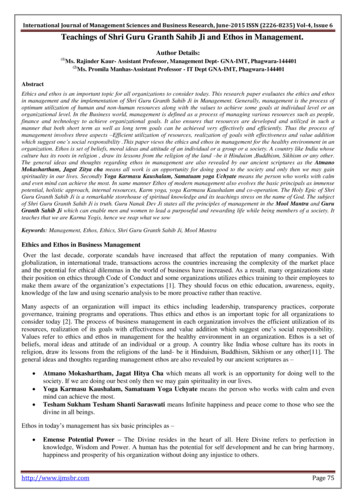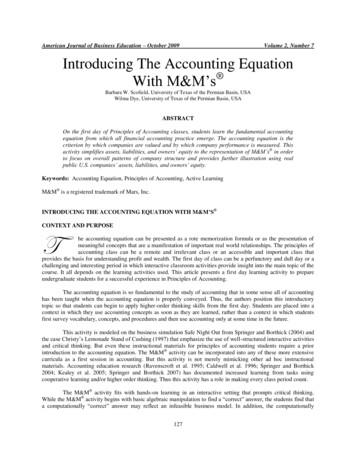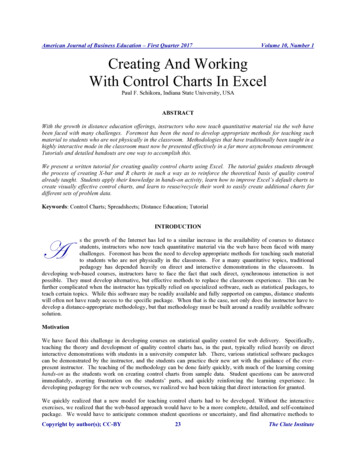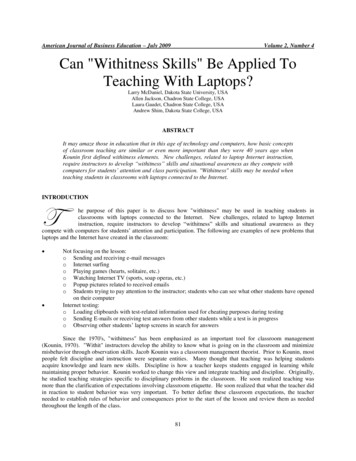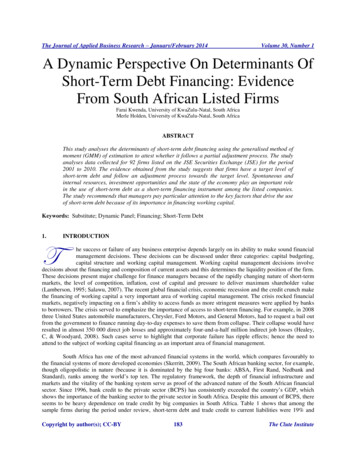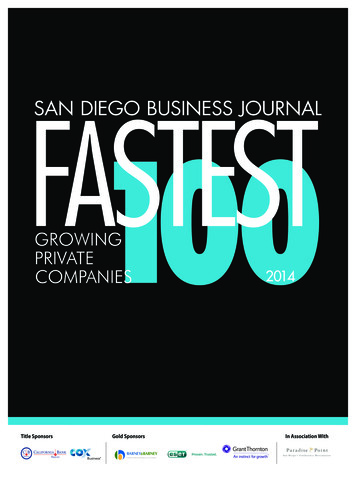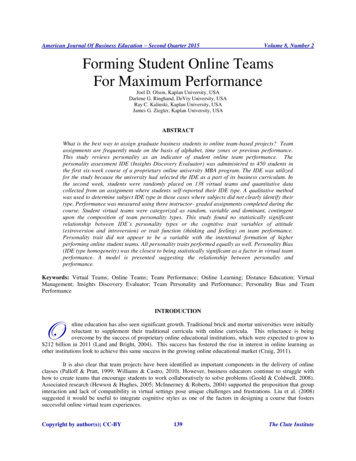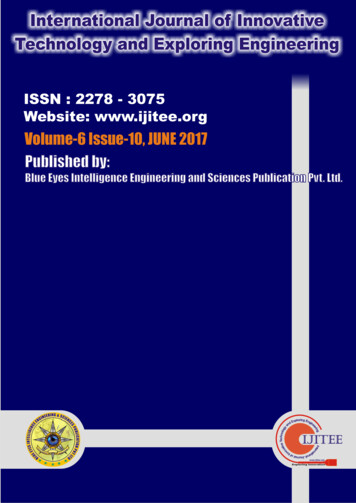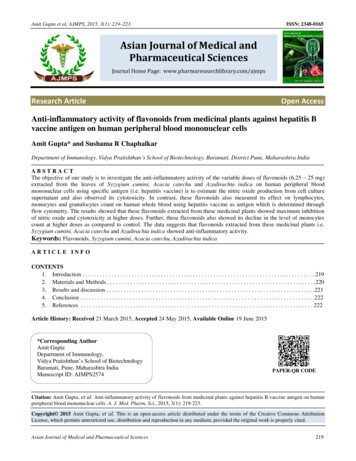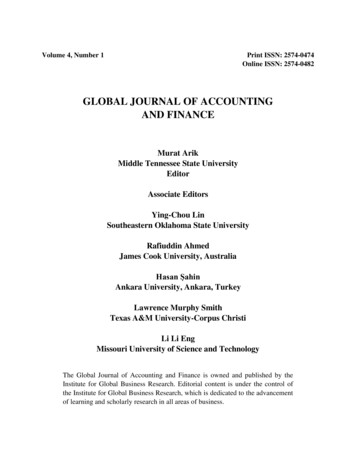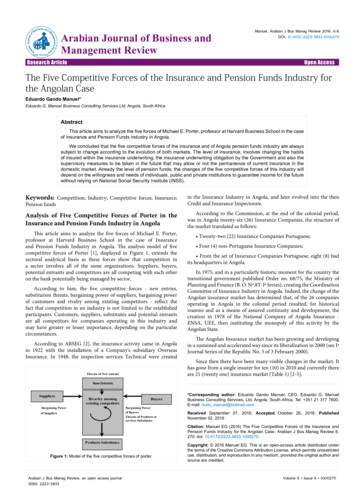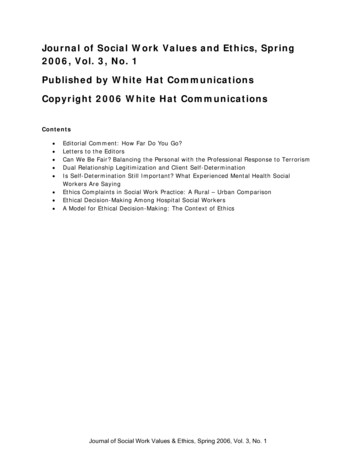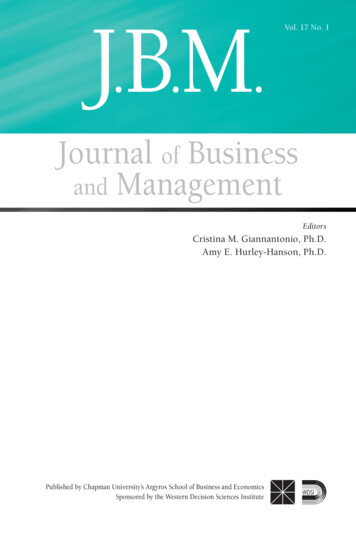
Transcription
J.B.M.Vol. 17 No. 1Journal of Businessand ManagementEditorsCristina M. Giannantonio, Ph.D.Amy E. Hurley-Hanson, Ph.D.Published by Chapman University’s Argyros School of Business and EconomicsSponsored by the Western Decision Sciences InstituteWDSI
WDSIWESTERN DECISION SCIENCES INSTITUTEThe Western Decision Sciences Institute is a regional division of the Decision SciencesInstitute. WDSI serves its interdisciplinary academic and business members primarilythrough the organization of an annual conference and the publication of the Journal ofBusiness and Management. The conference and journal allow academicians and businessprofessionals from all over the world to share information and research with respect to allaspects of education, business, and organizational decisions.PRESIDENTMahyar AmouzegarCalifornia State University, Long BeachPRESIDENT-ELECTNafisseh HeiatMontana State University-BillingsPROGRAM CHAIR/VICE PRESIDENT FOR PROGRAMS/PROCEEDINGS EDITORJohn DaviesVictoria University of WellingtonVICE PRESIDENT FOR PROGRAMS-ELECTSheldon R. SmithUtah Valley State CollegeVICE PRESIDENT FOR MEMBER SERVICESDavid YenMiami University of OhioSECRETARY/TREASURERRichard L. JensonUtah State UniversityDIRECTOR OF INFORMATION SYSTEMSAbbas HeiatMontana State University - BillingsIMMEDIATE PAST-PRESIDENTG. Keong LeongUniversity of Nevada, Las VegasREGIONAL VICE PRESIDENTVijay KannanUtah State University
Journal of Business and Management – Vol. 17, No. 1, 2011Journal of Business and ManagementVolume 17, Number 12011EDITORSCristina M. Giannantonio, Chapman UniversityAmy E. Hurley-Hanson, Chapman University
J.B.M.Journal of Businessand ManagementEDITORSCristina M. Giannantonio, Chapman UniversityAmy E. Hurley-Hanson, Chapman UniversityEDITORIAL BOARDNancy BorkowskiFlorida International UniversityKrishna S. DhirBerry CollegeSonia M. GoltzMichigan Tech UniversityMiles G. NichollsRMIT UniversityRichard L. JensonUtah State UniversityTerri A. ScanduraUniversity of MiamiJeffrey A. SonnenfeldYale UniversityVictor H. VroomYale UniversityPAST EDITORSBurhan Yavas, California State University Dominguez Hills 1993-1999Raymond Hogler, Colorado State University 2000-2004EDITORIAL STAFFRosalinda Monroy, Chapman University, Strategic Marketing and CommunicationsJaclyn Witt, Editorial Assistant
Journal of Business and Management – Vol. 17, No. 1, 2011We would like to thank the many ad hoc reviewers who shared their expertiseto review the manuscripts submitted to JBM over the past few years. Their time andeffort greatly contributed to the Journal of Business and Management.David A. BuchananNathan OstreichCranfield UniversitySan Diego State UniversityPearl BrewerFeraidoon RaafatUniversity of Nevada, Las VegasSan Diego State UniversityRussell W. ClaytonJames RairdonThe University of MississippiNational Academy UniversityDrew DahlBonnie RoachUtah State UniversityOhio UniversityBruce DehningValerie RosenblattChapman UniversityUniversity of Hawai’i at ManoaSusanna FellmanScott SafranskiUniversity of HelsinkiSaint Louis UniversitySusan FlahertyYusuf SidaniTowson UniversityAmerican University of BeirutStephen HartmanThomas W. SloanNew York Institute of TechnologyUniversity of Massachusetts, LowellAndrew HebdonYvonne StedhamUniversity of MississippiUniversity of Nevada, RenoSteve JarosRichard SudekSouthern UniversityChapman UniversityMark JohnsonAlexsey TikhomirovIdaho State UniversityBinghamton UniversityKaren M. LeonardNeharika VohraIndiana State University, Fort WayneIndian Institute of Management, AhmedabadMatthew McCarterYing WangChapman UniversityMontana State University, BillingsBjörn MichaelisHong ZhuUniversity of HeidelbergLoyola University Marylandiii
Journal of Business and Management – Vol. 17, No. 1, 2011
Journal of Business and Management – Vol. 17, No. 1, 2011vContentsFrederick Winslow Taylor: Reflections on the Relevance ofThe Principles of Scientific Management 100 Years Later.7.Cristina M. Giannantonio, Amy E. Hurley-HansonThe Centennial of Frederick W. Taylor’sThe Principles of Scientific Management: A Retrospective Commentary.11Daniel A. WrenTaylor is Dead, Hurray Taylor!The “human factor” in Scientific Management:Between Ethics, Scientific Psychology and Common Sense.23Riccardo Giorgio ZuffoThe Debate Goes On! A Graphic Portrayal OfThe Sinclair-Taylor Editorial Dialogue.43.Jeremy C. ShortCiting Taylor: Tracing Taylorism’s Technical andSociotechnical Duality through Latent Semantic Analysis.57Nicholas EvangelopoulosTaylor’s Unsung Contribution: Making Interchangeable Parts Practical.75.John PaxtonScientific Entrepreneurial Management: Bricolage, Bootstrapping,and the Quest for Efficiencies.85Manjula S. Salimath, Raymond J. Jones IIIFrederick W. Taylor’s Presence in 21st Century ManagementAccounting Systems and Work Process Theories.105.Marie G. Kulesza, Pamela Q. Weaver, Sheldon FriedmanThe Scientific Management of Information Overload.121.Linda L. Brennan
Journal of Business and Management – Vol. 17, No. 1, 2011
Giannantonio and Hurley-Hanson7Frederick Winslow Taylor:Reflections on the Relevance ofThe Principles ofScientific Management100 Years LaterCristina M. Giannantonio, Ph.D.Chapman UniversityAmy E. Hurley-Hanson, Ph.D.Chapman UniversityThis Special Edition of the Journal of Business and Management was organizedto celebrate the 100th anniversary of the publication of Frederick Winslow Taylor’sThe Principles of Scientific Management. The large response to our call for papers isindicative of the scholarly interest in Taylor, his work, and its relevance to managementpractitioners. The papers we received were broad in scope. While most were supportiveof scientific management, some felt that Taylor should not be honored. The meritsof Taylor’s work can certainly be debated, but what cannot be argued is that Taylorchanged the way people worked in the 20th century. This Special Issue focuses onthe relevance of Taylor’s work to managerial practice in the 21st century. The aim ofthis Special Issue is to encourage theoretical and empirical research on Taylor, ThePrinciples of Scientific Management, and its implications for managerial practice in the21st century.Frederick W. Taylor, the father of Scientific Management, was an Americanmechanical engineer, efficiency expert, and management consultant. In 1911 hepublished his seminal work, The Principles of Scientific Management, in which he laidout the process of scientifically studying work to increase worker and organizationalefficiency. The principles underlying his theory contributed to a wide array ofmanagement practices during the 20th century including task specialization, assemblyline production practices, job analysis, work design, incentive schemes, person-job fit,and production quotas and control.
8Journal of Business and Management – Vol. 17, No. 1, 2011The impact of Taylor’s work on the field of management has long been recognizedby management scholars. Wren and Hay’s (1977) study saw Taylor at the top of thelist among contributors to American management thought and practice. Heames &Breland’s (2010) study found Taylor to be at the top of their list thirty years later. ThePrinciples of Scientific Management, not only tops Bedeian and Wren’s (2001, p. 222) listof the 25 most influential management books of the 20th century, but they refer to itas “The most influential book on management ever published.” The 100th anniversaryof the publication of his book offers a unique opportunity to reflect on the relevance ofTaylor’s ideas in the 21st century.This Special Issue has eight articles. The first paper, The Centennial of FrederickW. Taylor’s The Principles of Scientific Management: A Retrospective Commentary, isby management scholar and historian Daniel A. Wren. Dr. Wren is the author of TheHistory of Management Thought, now in its 5th edition, and The Evolution of ManagementThought, with Arthur Bedian, also in its 6th edition. Wren received the DistinguishedEducator Award from the national Academy of Management for his contributions “as theforemost management historian of his generation.” Wren’s paper describes the eventsleading to the publication of The Principles of Scientific Management, the evolution fromtask management to scientific management, and the factors that contributed to scientificmanagement becoming an international force. Wren addresses “the intriguing questionof why Taylor and his ideas have a continuing grip on management literature and ourcurrent thinking” (Wren, 2011, p. 11). The Journal of Business and Management ishonored to have this noted management historian offer a retrospective commentary onTaylor’s The Principles of Scientific Management.Riccardo Giorgio Zuffo explores one aspect of the controversy surrounding Taylor’sideas in “Taylor is Dead, Hurray Taylor!” Zuffo details the criticisms of theorists whoargued that Taylor’s experiments were not positivist science, but instead, merelycommon sense. He then documents the scientific basis of Taylor’s experiments andhow his use of experiments both in and out of the lab led to the formulation of ThePrinciples of Scientific Management. This paper also delves into the political, social,and ethical aspects of Taylor’s work, exploring how Taylor’s intentions were to create abetter society by eliminating conflict using science.Jeremy C. Short offers a novel perspective on the Taylor - Sinclair editorial debatesthat appeared in The American Magazine. In “The Debate Goes On! A Graphical Portrayalof the Sinclair-Taylor Editorial Dialogue,” Short discusses how issues argued in the1911 Taylor - Sinclair debate are still relevant today. In the same year that The Principlesof Scientific Management was published, Taylor engaged in an editorial debate withUpton Sinclair, author of The Jungle. Upton’s novel detailing horrific health and safetyworking conditions in the meat packing industry led to the establishment of the Foodand Drug Administration. Upton Sinclair was critical of Taylor’s methods, believingthat scientific management exploited workers. Taylor believed that the implementationof scientific management would lead to improved working conditions for the workers.Short’s paper highlights the impact Taylor’s work had on the working conditions ofemployees in the 20th century and reminds us that work and the conditions underwhich it is performed have long been topics of scholarly and societal interest.“Citing Taylor: Tracing Taylorism’s Technical and Sociotechnical Duality through
Giannantonio and Hurley-Hanson9Latent Semantic Analysis” by Nicholas Evangelopoulos offers further evidence thatwork performance is the subject of much scholarly interest. Evangelopoulos appliesLatent Semantic Analysis to assess the intellectual territory that has been influencedby Taylor’s ideas. His analysis found that research on Taylor fell into two streams:technical and sociotechnical. Evangelopoulos suggests that it is this inherent dualitythat assures Scientific Management of its continuing relevance in the 21st century.John Paxton’s paper focuses on a lesser known aspect of Taylor’s contribution tomanufacturing. “Taylor’s Unsung Contribution: Making Interchangeable Parts Practical”details Taylor’s work to produce interchangeable parts that were durable, reliable, andcost-efficient. Paxton explains how interchangeable parts were the foundation whichallowed mass production to become a practical manufacturing reality. Paxton’s paperreminds us that Taylor’s training and experience as an industrial engineer influencedhis interest in solving the problem of production machinery breakdowns. Taylor’srole in making interchangeable parts economically feasible and the impact of this onmanufacturing is thoroughly described in this paper.Majula Salimath and Raymond Jones III discuss the scientific management ofentrepreneurship. Their paper, “Scientific Entrepreneurial Management: Bricolage,Bootstrapping, and the Question for Efficiencies,” argues that Taylor’s principles ofefficiency can be successfully applied in entrepreneurial firms and small businesses.Salimath and Jones describe the emerging field of scientific entrepreneurial management.The paper presents bricolage (making do with what is available) and bootstrapping(continuing operations without external finances or aid) as two techniques for managingresources. Salimath and Jones discuss the similarity of bricolage and bootstrapping tothe resource management principles inherent in Scientific Management.Marie Kulesza, Sheldon Friedman, and Pamela Weaver’s paper, “Frederick Taylor’sPresence in 21st Century Management Accounting Systems and Work Process Theories,”examines the influence of Taylor’s work on modern accounting systems. Their paperalso examines Taylor’s experiences working to design accounting systems suited to hisclients’ needs. Taylor’s development of cost accounting systems closely paralleled thedevelopment of his ideas regarding worker efficiency. This paper offers strong evidencethat Taylor’s ideas are not limited to the field of Management, but are applicable acrossmultiple functional areas of business (e.g. Accounting) in the 21st century.The final paper in this Special Issue is by Linda Brennan. In “The ScientificManagement of Information Overload,” Brennan focuses on the applicability of Taylor’sideas to today’s information workers. The paper considers how knowledge workersare faced with ever-increasing issues of information overload. Brennan offers a uniqueand thought-provoking analysis of the inefficiencies surrounding the managementof information in the work place. Bre
PROGRAM CHAIR/VICE PRESIDENT FOR PROGRAMS/PROCEEDINGS EDITOR John Davies Victoria University of Wellington VICE PRESIDENT FOR PROGRAMS-ELECT Sheldon R. Smith Utah Valley State College VICE PRESIDENT FOR MEMBER SERVICES David Yen Miami University of Ohio SECRETARY/TREASURER Richard L. Jenson Utah State University DIRECTOR OF INFORMATION
